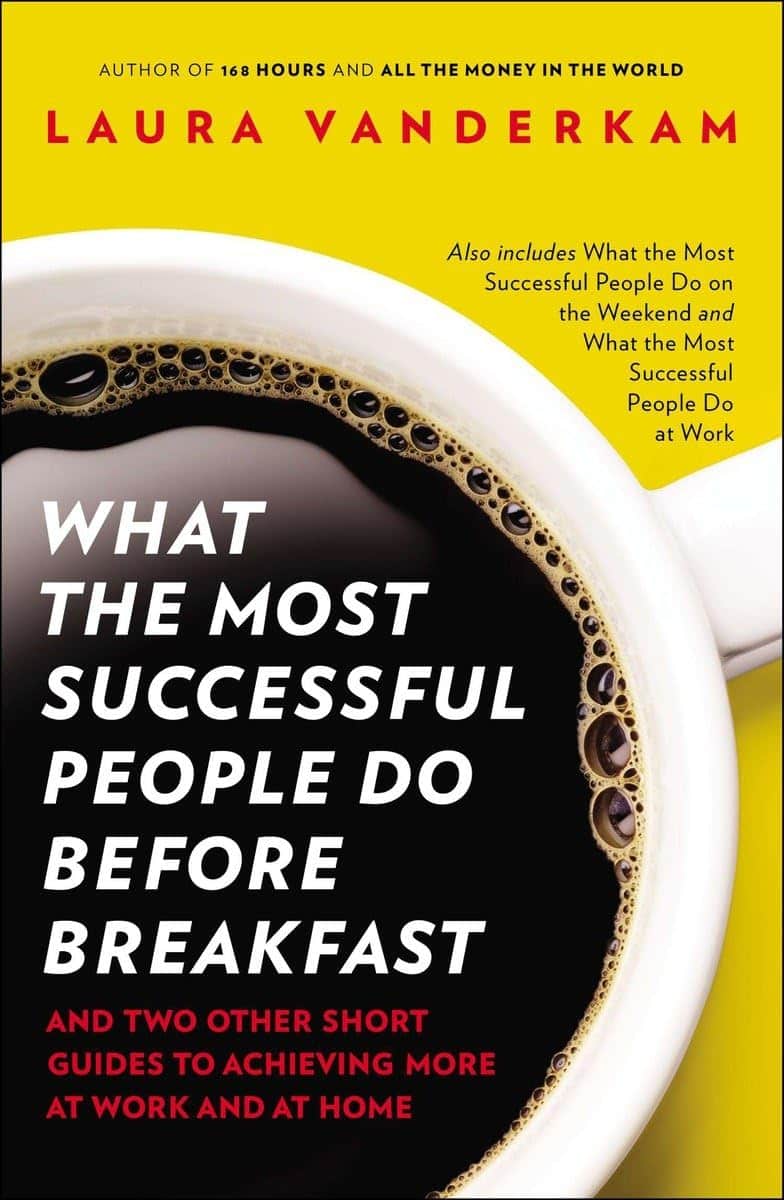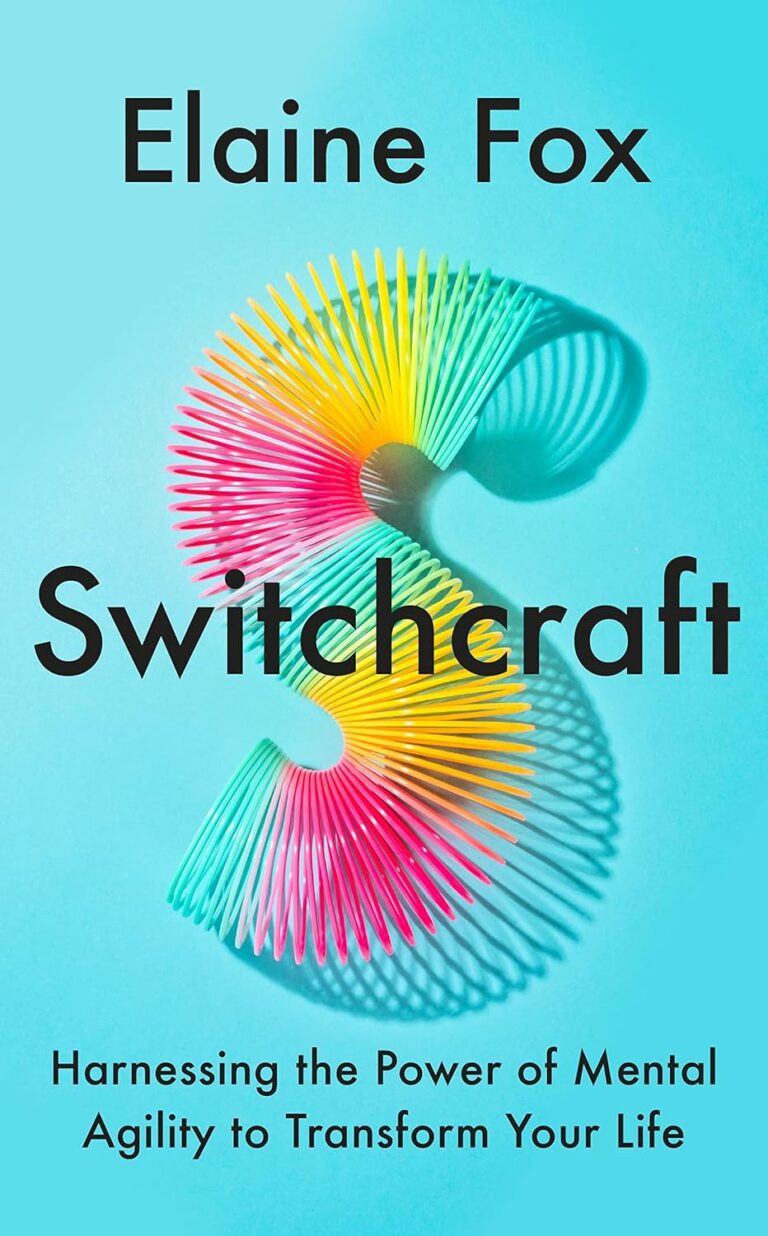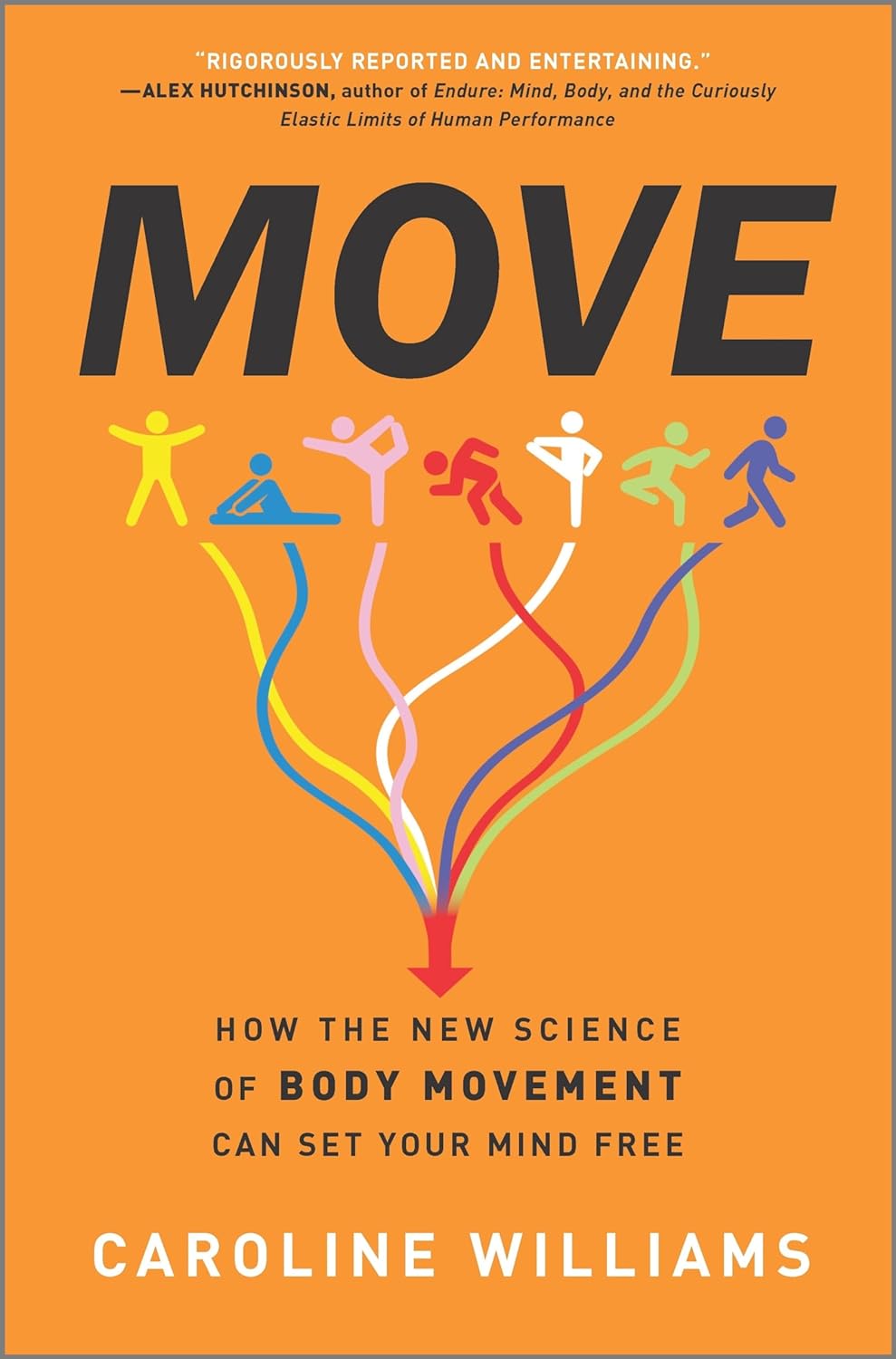
What the Most Successful People Do Before Breakfast – by Laura Vanderkram
10almonds is reader-supported. We may, at no cost to you, receive a portion of sales if you purchase a product through a link in this article.
First, what this is not:this is not a rehash of “The 5AM Club”, and nor is it a rehash of “The Seven Habits of Highly Effective People”.
What it is: packed with tips about time management for real people operating here in the real world. The kind of people who have non-negotiable time-specific responsibilities, and frequent unavoidable interruptions. The kind of people who have partners, families, and personal goals and aspirations too.
The “two other short guides” mentioned in the subtitle are her other books, whose titles start the same but instead of “…before Breakfast”, substitute:
- …on the Weekend
- …at Work
However, if you’re retired (we know many of our subscribers are), this still applies to you:
- The “weekend” book is about getting the most out of one’s leisure time, and we hope you have that too!
- The “work” book is about not getting lost in the nitty-gritty of the daily grind, and instead making sure to keep track of the big picture. You probably have this in your personal projects, too!
Bottom line: if, in the mornings, it sometimes seems like your get-up-and-go has got up and gone without you, then you will surely benefit from this book that outstrips its competitors in usefulness and applicability.
Don’t Forget…
Did you arrive here from our newsletter? Don’t forget to return to the email to continue learning!
Recommended
Learn to Age Gracefully
Join the 98k+ American women taking control of their health & aging with our 100% free (and fun!) daily emails:

Move – by Caroline Williams
10almonds is reader-supported. We may, at no cost to you, receive a portion of sales if you purchase a product through a link in this article.
- Get 150 minutes of moderate exercise per week, says the American Heart Association
- There are over 10,000 minutes per week, says the pocket calculator
Is 150/10,000 really the goal here? Really?
For Caroline Williams, the answer is no.
In this book that’s practically a manifesto, she outlines the case that:
- Humans evolved to move
- Industrialization and capitalism scuppered that
- We now spend far too long each day without movement
Furthermore, for Williams this isn’t just an anthropological observation, it’s a problem to be solved, because:
- Our lack of movement is crippling us—literally
- Our stagnation affects not just our bodies, but also our minds
- (again literally—there’s a direct correlation with mental health)
- We urgently need to fix this
So, what now, do we need to move in to the gym and become full-time athletes to clock up enough hours of movement? No.
Williams convincingly argues the case (using data from supercentenarian “blue zones” around the world) that even non-exertive movement is sufficient. In other words, you don’t have to be running; walking is great. You don’t have to be lifting weights; doing the housework or gardening will suffice.
From that foundational axiom, she calls on us to find ways to build our life around movement… rather than production-efficiency and/or convenience. She gives plenty of tips for such too!
Bottom line: some books are “I couldn’t put it down!” books. This one’s more of a “I got the urge to get up and get moving!” book.
Get your get-up-and-go up and going with “Move”—order yours from Amazon today!
Share This Post

With all this bird flu around, how safe are eggs, chicken or milk?
10almonds is reader-supported. We may, at no cost to you, receive a portion of sales if you purchase a product through a link in this article.
Enzo Palombo, Swinburne University of Technology
Recent outbreaks of bird flu – in US dairy herds, poultry farms in Australia and elsewhere, and isolated cases in humans – have raised the issue of food safety.
So can the virus transfer from infected farm animals to contaminate milk, meat or eggs? How likely is this?
And what do we need to think about to minimise our risk when shopping for or preparing food?

AS Foodstudio/Shutterstock How safe is milk?
Bird flu (or avian influenza) is a bird disease caused by specific types of influenza virus. But the virus can also infect cows. In the US, for instance, to date more than 80 dairy herds in at least nine states have been infected with the H5N1 version of the virus.
Investigations are under way to confirm how this happened. But we do know infected birds can shed the virus in their saliva, nasal secretions and faeces. So bird flu can potentially contaminate animal-derived food products during processing and manufacturing.
Indeed, fragments of bird flu genetic material (RNA) were found in cow’s milk from the dairy herds associated with infected US farmers.
However, the spread of bird flu among cattle, and possibly to humans, is likely to have been caused through contact with contaminated milking equipment, not the milk itself.
The test used to detect the virus in milk – which uses similar PCR technology to lab-based COVID tests – is also highly sensitive. This means it can detect very low levels of the bird flu RNA. But the test does not distinguish between live or inactivated virus, just that the RNA is present. So from this test alone, we cannot tell if the virus found in milk is infectious (and capable of infecting humans).

It’s best to stick with pasteurised milk. Amnixia/Shutterstock Does that mean milk is safe to drink and won’t transmit bird flu? Yes and no.
In Australia, where bird flu has not been reported in dairy cattle, the answer is yes. It is safe to drink milk and milk products made from Australian milk.
In the US, the answer depends on whether the milk is pasteurised. We know pasteurisation is a common and reliable method of destroying concerning microbes, including influenza virus. Like most viruses, influenza virus (including bird flu virus) is inactivated by heat.
Although there is little direct research on whether pasteurisation inactivates H5N1 in milk, we can extrapolate from what we know about heat inactivation of H5N1 in chicken and eggs.
So we can be confident there is no risk of bird flu transmission via pasteurised milk or milk products.
However, it’s another matter for unpasteurised or “raw” US milk or milk products. A recent study showed mice fed raw milk contaminated with bird flu developed signs of illness. So to be on the safe side, it would be advisable to avoid raw milk products.
How about chicken?
Bird flu has caused sporadic outbreaks in wild birds and domestic poultry worldwide, including in Australia. In recent weeks, there have been three reported outbreaks in Victorian poultry farms (two with H7N3 bird flu, one with H7N9). There has been one reported outbreak in Western Australia (H9N2).
The strains of bird flu identified in the Victorian and Western Australia outbreaks can cause human infection, although these are rare and typically result from close contact with infected live birds or contaminated environments.
Therefore, the chance of bird flu transmission in chicken meat is remote.
Nonetheless, it is timely to remind people to handle chicken meat with caution as many dangerous pathogens, such as Salmonella and Campylobacter, can be found on chicken carcasses.
Always handle chicken meat carefully when shopping, transporting it home and storing it in the kitchen. For instance, make sure no meat juices cross-contaminate other items, consider using a cool bag when transporting meat, and refrigerate or freeze the meat within two hours.
Avoid washing your chicken before cooking to prevent the spread of disease-causing microbes around the kitchen.
Finally, cook chicken thoroughly as viruses (including bird flu) cannot survive cooking temperatures.
Are eggs safe?
The recent Australian outbreaks have occurred in egg-laying or mixed poultry flocks, so concerns have been raised about bird flu transmission via contaminated chicken eggs.
Can flu viruses contaminate chicken eggs and potentially spread bird flu? It appears so. A report from 2007 said it was feasible for influenza viruses to enter through the eggshell. This is because influenza virus particles are smaller (100 nanometres) than the pores in eggshells (at least 200 nm).
So viruses could enter eggs and be protected from cleaning procedures designed to remove microbes from the egg surface.
Therefore, like the advice about milk and meat, cooking eggs is best.
The US Food and Drug Administration recommends cooking poultry, eggs and other animal products to the proper temperature and preventing cross-contamination between raw and cooked food.
In a nutshell
If you consume pasteurised milk products and thoroughly cook your chicken and eggs, there is nothing to worry about as bird flu is inactivated by heat.
The real fear is that the virus will evolve into highly pathogenic versions that can be transmitted from human to human.
That scenario is much more frightening than any potential spread though food.
Enzo Palombo, Professor of Microbiology, Swinburne University of Technology
This article is republished from The Conversation under a Creative Commons license. Read the original article.
Share This Post

Chocolate & Health
10almonds is reader-supported. We may, at no cost to you, receive a portion of sales if you purchase a product through a link in this article.
Chocolate & Health: Fact or Fiction?
“Chocolate Is Good For The Heart”
“When making chocolate chip cookies, you don’t measure using cups, you measure by heart”
…but how good is chocolate when it comes to heart health?
First, what is heart health?
A healthy heart typically has a low resting pulse rate and a strong, steady beat. This is affected strongly by exercise habits, and diet plays only a support role (can’t exercise without energy from food!).
It is also important to have blood pressure within a healthy range (with high blood pressure being a more common problem than low, so things that lower blood pressure are generally considered good).
- Flavanols, flavonoids, and polyphenols in chocolate contribute to lower blood pressure
- Dark chocolate is best for these, as milk chocolate contains much less cocoa solids and more unhelpful fats
- White chocolate contains no cocoa solids and is useless for this
- Some of the fats in most commercial chocolate can contribute to atherosclerosis which raises blood pressure and ultimately can cause heart attacks.
- If you’re diabetic, you will probably not get the usual heart-related benefits from chocolate (sorry)
The Verdict: dark chocolate, in moderation, can support good heart health.
“Chocolate Is Good For The Brain”
Chocolate has been considered a “brain food”… why?
- The brain uses more calories than any other organ (chocolate has many calories)
- The heart benefits we listed above mean improved blood flow—including to your brain
- Chocolate contains phenylethylamine, a powerful chemical that has a similar effect to amphetamines… But it’s metabolized in digestion and never makes it to the central nervous system (so basically, this one’s a miss; we had a good run with the other two, though!)
The Verdict: dark chocolate, in moderation, can support good brain health
“Chocolate Is An Aphrodisiac”
“If chocolate be the food of love, pass me that cocoa; I’m starving”
Most excitingly, chocolate contains phenylethylamine, the “molecule of love” or, more accurately, lust. It has an effect similar to amphetamines, and while we can synthesize it in the body, we can also get it from certain foods. But…
Our body is so keen to get it that most of it is metabolized directly during digestion and doesn’t make it to the brain. Also, chocolate is not as good a source as cabbage—do with that information what you will!
However!
Chocolate contains theobromine and small amounts of caffeine, both stimulants and both generally likely to improve mood; it also contains flavonoids which in turn stimulate production of nitric oxide, which is a relaxant. All in all, things that are convivial to having a good time.
On the other hand…
That relaxation comes specifically with a reduction in blood pressure—something typically considered good for the health for most people most of the time… but that means lowering blood pressure in all parts of your body, which could be the opposite of what you want in intimate moments.
Chocolate also contains zinc, which is essential for hormonal health for most people—the body uses it to produce testosterone and estrogen, respectively. Zinc supplements are popularly sold to those wishing to have more energy in general and good hormonal health in particular, and rightly so. However…
This approach requires long-term supplementation—you can’t just pop a zinc tablet / bar of chocolate / almond before bed and expect immediate results. And if your daily zinc supplementation takes the form of a 3.5oz (100g) bar of chocolate, then you may find it has more effects on your health, and not all of them good!
The Verdict: dark chocolate, in moderation, may promote “the mood”, but could be a double-edged sword when it comes to “the ability”.
“Chocolate Is Good During Menstruation”
The popular wisdom goes that chocolate is rich in iron (of which more is needed during menstruation), and indeed, if you eat 7oz (150g) of dark chocolate made with 85% cocoa, you’ll get a daily a dose of iron (…and nearly 1,000 calories).
More bang-for-buck dietary sources of iron include chickpeas and broccoli, but for some mysterious reason, these are not as commonly reported as popular cravings.
The real explanation for chocolate cravings is more likely that eating chocolate—a food high in sugar and fat along with a chemical bombardment of more specialized “hey, it’s OK, you can relax now” molecules (flavanols/flavonoids, polyphenols, phenylamines, even phenylethylamine, etc) gives a simultaneous dopamine kick (the body’s main “reward” chemical) with a whole-body physiological relaxation… so, little wonder we might crave it in times of stress and discomfort!
The Verdict: it helps, not because it serves a special nutritional purpose, but rather, because the experience of eating chocolate makes us feel good.
Fun fact: Tiramisu (this writer’s favorite dessert) is literally Italian for “pick-me-up”
Share This Post
Related Posts

PTSD, But, Well…. Complex.
10almonds is reader-supported. We may, at no cost to you, receive a portion of sales if you purchase a product through a link in this article.
PTSD is typically associated with military veterans, for example, or sexual assault survivors. There was a clear, indisputable, Bad Thing™ that was experienced, and it left a psychological scar. When something happens to remind us of that—say, there are fireworks, or somebody touches us a certain way—it’ll trigger an immediate strong response of some kind.
These days the word “triggered” has been popularly misappropriated to mean any adverse emotional reaction, often to something trivial.
But, not all trauma is so clear. If PTSD refers to the result of that one time you were smashed with a sledgehammer, C-PTSD (Complex PTSD) refers to the result of having been hit with a rolled-up newspaper every few days for fifteen years, say.
This might have been…
- childhood emotional neglect
- a parent with a hair-trigger temper
- bullying at school
- extended financial hardship as a young adult
- “just” being told or shown all too often that your best was never good enough
- the persistent threat (real or imagined) of doom of some kind
- the often-reinforced idea that you might lose everything at any moment
If you’re reading this list and thinking “that’s just life though”, you might be in the estimated 1 in 5 people with (often undiagnosed) C-PTSD.
How About You? Take The (5mins) Test Here
Now, we at 10almonds are not doctors or therapists and even if we were, we certainly wouldn’t try to diagnose from afar. But, even if there’s only a partial match, sometimes the same advice can help.
So what are the symptoms of C-PTSD?
- A feeling that nothing is safe; we might suddenly lose what we have gained
- The body keeps the score… And it shows. We may have trouble relaxing, an aversion to exercise for reasons that don’t really add up, or an aversion to being touched.
- Trouble sleeping, born of nagging sense that to sleep is to be vulnerable to attack, and/or lazy, and/or negligent of our duties
- Poor self-image, about our body and/or about ourself as a person.
- We’re often drawn to highly unavailable people—or we are the highly unavailable person to which our complementary C-PTSD sufferers are attracted.
- We are prone to feelings of rage. Whether we keep a calm lid on it or lose our temper, we know it’s there. We’re angry at the world and at ourselves.
- We are not quick to trust—we may go through the motions of showing trust, but we’re already half-expecting that trust to have been misplaced.
- “Hell is other people” has become such a rule of life that we may tend to cloister ourselves away from company.
- We may try to order our environment around us as a matter of safety, and be easily perturbed by sudden changes being imposed on us, even if ostensibly quite minor or harmless.
- In a bid to try to find safety, we may throw ourselves into work—whatever that is for us. It could be literally our job, or passion projects, or our family, or community, and in and of itself that’s great! But the motivation is more of an attempt to distract ourselves from The Horrors™.
“Alright, I scored more of those than I care to admit. What now?”
A lot of the answer lies in first acknowledging to yourself what happened, to make you feel the way you do now. If you, for example, have an abject hatred of Christmas, what were your childhood Christmases like? If you fear losing money that you’ve accumulated, what underpins that fear? It could be something that directly happened to you, but it also could just be repeated messages you received from your parents, for example.
It could even be that you had superficially an idyllic perfect childhood. Health, wealth, security, a loving family… and simply a chemical imbalance in your brain made it a special kind of Hell for you that nobody understood, and perhaps you didn’t either.
Unfortunately, a difficult task now lies ahead: giving love, understanding, compassion, and reassurance to the person for whom you may have the most contempt in the world: yourself.
If you’d like some help with that, here are some resources:
ComplexTrauma.org (a lot of very good free resources, with no need for interaction)
CPTSD Foundation (mostly paid courses and the like)
Some final words about healing…
- You are in fact amazing,
- You can do it, and
- You deserve it.
Don’t Forget…
Did you arrive here from our newsletter? Don’t forget to return to the email to continue learning!
Learn to Age Gracefully
Join the 98k+ American women taking control of their health & aging with our 100% free (and fun!) daily emails:

4 Tips To Stand Without Using Hands
10almonds is reader-supported. We may, at no cost to you, receive a portion of sales if you purchase a product through a link in this article.
The “sit-stand” test, getting up off the floor without using one’s hands, is well-recognized as a good indicator of healthy aging, and predictor of longevity. But what if you can’t do it? Rather than struggling, there are exercises to strengthen the body to be able to do this vital movement.
Step by step
Teresa Shupe has been teaching Pilates professionally full-time for over 25 years, and here’s what she has to offer in the category of safe and effective ways of improving balance and posture while doing the sitting-to-standing movement:
- Squat! Doing squats (especially deep ones) regularly strengthens all the parts necessary to effectively complete this movement. If your knees aren’t up to it at first, do the squats with your back against a wall to start with.
- Roll! On your back, cross your feet as though preparing to stand, and rock-and-roll your body forwards. To start with you can “cheat” and use your fingertips to give a slight extra lift. This exercise builds mobility in the various necessary parts of the body, and also strengthens the core—as well as getting you accustomed to using your bodyweight to move your body forwards.
- Lift! This one’s focusing on that last part, and taking it further. Because it may be difficult to get enough momentum initially, you can practice by holding small weights in your hands, to shift your centre of gravity forwards a bit. Unlike many weights exercises, in this case you’re going to transition to holding less weight rather than more, though.
- Complete! Continue from the above, without weights now; use the blades of your feet to stand. If you need to, use your fingertips to give you a touch more lift and stability, and reduce the fingers that you use until you are using none.
For more on each of these as well as a visual demonstration, enjoy this short video:
Click Here If The Embedded Video Doesn’t Load Automatically!
Further reading
For more exercises with a similar approach, check out:
Mobility As A Sporting Pursuit
Take care!
Don’t Forget…
Did you arrive here from our newsletter? Don’t forget to return to the email to continue learning!
Learn to Age Gracefully
Join the 98k+ American women taking control of their health & aging with our 100% free (and fun!) daily emails:

How To Get More Nutrition From The Same Food
10almonds is reader-supported. We may, at no cost to you, receive a portion of sales if you purchase a product through a link in this article.
How To Get More Out Of What’s On Your Plate
Where does digestion begin? It’s not the stomach. It’s not even the mouth.
It’s when we see and smell our food; maybe even hear it! “Sell the sizzle, not the steak” has a biological underpinning.
At that point, when we begin to salivate, that’s just one of many ways that our body is preparing itself for what we’re about to receive.
When we grab some ready-meal and wolf it down, we undercut that process. In the case of ready-meals, they often didn’t have much nutritional value, but even the most nutritious food isn’t going to do us nearly as much good if it barely touches the sides on the way down.
We’re not kidding about the importance of that initial stage of our external senses, by the way:
- Food perception primes hepatic endoplasmic reticulum homeostasis via melanocortin-dependent control of mTOR activation
- Olfaction regulates organismal proteostasis and longevity via microRNA-dependent signalling
So, mindful eating is not just something for Instagrammable “what I eat in a day” aesthetic photos, nor is just for monks atop cold mountains. There is actual science here, and a lot of it.
It starts with ingredients
“Eating the rainbow” (no, Skittles do not count) is great health advice for getting a wide variety of micronutrients, but it’s also simply beneficial for our senses, too. Which, as above-linked, makes a difference to digestion and nutrient absorption.
Enough is enough
That phrase always sounds like an expression of frustration, “Enough is enough!”. But, really:
Don’t overcomplicate your cooking, especially if you’re new to this approach. You can add in more complexities later, but for now, figure out what will be “enough”, and let it be enough.
The kitchen flow
Here we’re talking about flow in the Csikszentmihalyi sense of the word. Get “into the swing of things” and enjoy your time in the kitchen. Schedule more time than you need, and take it casually. Listen to your favourite music. Dance while you cook. Taste things as you go.
There are benefits, by the way, not just to our digestion (in being thusly primed and prepared for eating), but also to our cognition:
In The Zone: Flow State and Cognition in Older Adults
Serve
No, not just “put the food on the table”, but serve.
Have a pleasant environment; with sensory pleasures but without too many sensory distractions. Think less “the news on in the background” and more smooth jazz or Mozart or whatever works for you. Use your favourite (small!) plates/bowls, silverware, glasses. Have a candle if you like (unscented!).
Pay attention to presentation on the plate / in the bowl / in any “serve yourself” serving-things. Use a garnish (parsley is great if you want to add a touch of greenery without changing the flavor much). Crack that black pepper at the table. Make any condiments count (less “ketchup bottle” and more “elegant dip”).
Take your time
Say grace if that fits with your religious traditions, and/or take a moment to reflect on gratitude.
In many languages there’s a pre-dinner blessing that most often translates to “good appetite”. This writer is fond of the Norwegian “Velbekommen”, and it means more like “May good come of it for you”, or “May it do you good”.
Then, enjoy the food.
For the most even of blood sugar levels, consider eating fiber, protein/fat, carbs, in that order.
Why? See: 10 Ways To Balance Blood Sugars
Chew adequately and mindfully. Put your fork (or spoon, or chopsticks, or whatever) down between bites. Drink water alongside your meal.
Try to take at least 20 minutes to enjoy your meal, and/but any time you go to reach for another helping, take a moment to check in with yourself with regard to whether you are actually still hungry. If you’re not, and are just eating for pleasure, consider deferring that pleasure by saving the food for later.
At this point, people with partners/family may be thinking “But it won’t be there later! Someone else will eat it!”, and… That’s fine! Be happy for them. You can cook again tomorrow. You prepared delicious wholesome food that your partner/family enjoyed, and that’s always a good thing.
Want to know more about the science of mindful eating?
Check out Harvard’s Dr. Lilian Cheung on Mindful Eating here!
Don’t Forget…
Did you arrive here from our newsletter? Don’t forget to return to the email to continue learning!
Learn to Age Gracefully
Join the 98k+ American women taking control of their health & aging with our 100% free (and fun!) daily emails:









